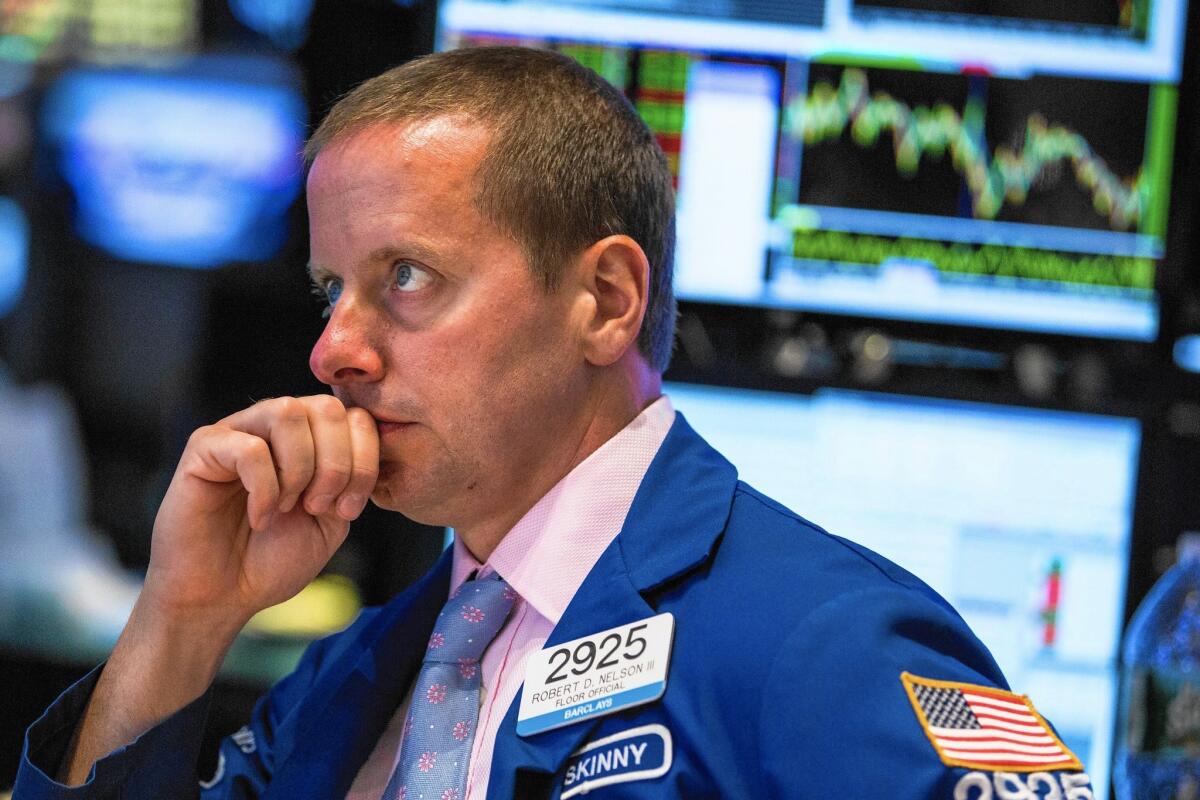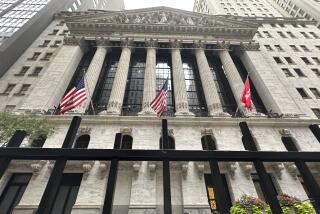Why September, a historically bad month for stocks, is more worrisome than usual

- Share via
Reporting from new york — Stock investors hoping for a bit of relief after a rough August, take warning: September is historically a bad month for stocks, and this one offers a few more potholes than usual.
September is the only month of the year in which the Standard & Poor’s 500 index has fallen more often than it has risen in the post-World War II era, according to Sam Stovall, U.S. equity strategist for S&P Capital IQ. It’s also the month that has produced the worst average return, a negative 0.63%, compared with a positive 0.66% for the average month from the end of 1945 through Friday.
“We start a month with a bad reputation,” he wrote in a recent note.
TODAY: U.S. market opens sharply down after bleak Chinese economy report>>
That’s an unnerving prospect for investors who watched major stock indexes — jarred by fears of a stumbling Chinese economy and mixed signals from the Federal Reserve on when the central bank might raise interest rates — skid more than 6% in August after another down day Monday. The S&P 500 fell 16.69 points, or 0.8%, to 1,972.18, and the blue-chip Dow Jones industrial average dropped 114.98 points, or 0.7%, to 16,528.03.
In all, the S&P fell more than 12.4% from its May 21 peak through a trough on Aug. 25, before recovering somewhat at the end of last week. Broad markets are now firmly in negative territory for the year, with the S&P 500 off more than 4% and the Dow down more than 7%.
Why September has been unfriendly to stock investors is a matter of some debate. Stovall said one culprit might be the impatience of investors who tend to give up on underperforming stocks by the end of the third quarter. Another might be mutual funds, which often sell poor-performing stocks to avoid investor complaints.
“They want to get things out of the way that haven’t worked for them,” said Alan Whitman, a Morgan Stanley managing director. “It looks a little nicer when they report their numbers.”
But while October is better known for calamitous crashes — in 1929, 1987 and the bear market of 2008 that began quietly in October the year before — September has done the most damage, and this one is especially fraught, analysts said.
Even setting aside worrisome slowdowns in China and emerging markets generally, analyst said the intrigue over the Fed’s intentions on interest rates has only deepened as the Sept. 16-17 meeting of its Federal Open Market Committee approaches.
Markets have been particularly rattled by what analysts called mixed signals from hawks and doves among the Fed’s Board of Governors, with investors reacting Monday to Vice Chairman Stanley Fischer’s remarks at the Fed weekend symposium in Jackson Hole, Wyo., that inflation is likely to rebound as the U.S. dollar loses strength.
“Nobody knows where the Fed’s at, at this point,” Whitman said. “That mystery is even more confusing now.”
More fundamentally, corporate earnings appear to be slowing. S&P Capital IQ estimates that earnings of the S&P 500 will decline 4% in the third quarter compared with a year earlier. Earnings increases from such sectors as consumer discretionary companies, telecom and financial firms are expected to be more than offset by a huge 63% decline in energy sector earnings, along with significant slowing in the basic materials, consumer staples and industrial sectors.
Even tech, once an earnings bright spot, is projected to show only 0.6% earnings growth in the third quarter, providing another reason for nervous investors to look for an exit this month.
More bearish signs? The current bull market began in March 2009, and only two other bull markets have celebrated their seventh birthday since World War II, S&P Capital’s Stovall said.
Bear markets, a fall of 20% from their peak, historically they don’t stop there. Bear markets since World War II dropped an average of 33%, and even corrections — defined as fall of 10% peak to trough — tend to overshoot that mark, Stovall said.
Finally, he added, when the S&P declines more than 5% in August, it has fallen in more than 80% of subsequent postwar Septembers, with the average drop of 4%.
Head for the hills? Not necessarily.
Stovall and other analysts note that the economic recovery, although never robust, still has some room to run. John Lonski, chief economist for Moody’s Analytics, said as long as earnings continue to grow, corporations can continue to pay dividends on stocks, which provide relatively attractive returns in an otherwise dismal investment landscape.
“It’s a meager one, but it’s still a recovery,” Lonski said.
What’s more, according to a report from analyst Binky Chadha and others at Deutsche Bank, stock market corrections of more than 10% outside of a recession are rare and usually are associated with a “clear unanticipated negative shock,” such as the political brinkmanship that led to Standard & Poor’s downgrade of U.S. debt in 2011 or the Russian/Asian debt crises of 1998.
Although indexes are currently in negative territory, analysts said it’s not hard to imagine a scenario in which they recover to mid-single digits on the positive side — the Wall Street consensus for the market at the start of the year.
Even September could contain an upside surprise, analysts said.
“It’s not as if you’ve had monumental corrections [on average] in September,” Morgan Stanley’s Whitman said. “It’s just an average.”
Twitter: @deanstarkman
ALSO:
Polish authorities seal off area believed to hide Nazi gold train
Ex-Secret Service agent pleads guilty in Silk Road case; he pocketed $820,000 in bitcoin
Three powerful Pacific hurricanes churning at the same time make weather history
More to Read
Inside the business of entertainment
The Wide Shot brings you news, analysis and insights on everything from streaming wars to production — and what it all means for the future.
You may occasionally receive promotional content from the Los Angeles Times.











